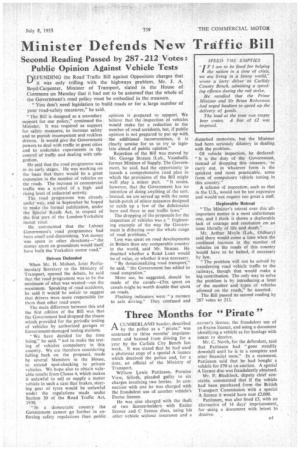Minister Defends New Traffic Bill
Page 47

If you've noticed an error in this article please click here to report it so we can fix it.
Second Reading Passed by 287-212 Votes:. Public Opinion Against Vehicle Tests•
DEFENDING the Road Traffic Bill against Opposition charges that it was only trifling with the highways problem, Mr. J. A. Boyd-Carpenter, Minister of Transport, stated in the House of Commons on Monday that it had not to be assumed that the whole of the Government's road policy must be embodied in the measure. "You don't need legislation to build roads or for a. large number of your road-safety measures," he said.
" The Bill is designed as a secondary support for our policy," continued the Minister. It was required as support for safety measures, to increase safety and to punish incompetent and reckless drivers. It would give the Government powers to deal with traffic in great cities and to undertake experiments in the control of traffic and dealing with coilgestion.
He said that the road programme was in its early stages. He was working on the basis that there would be a great expansion in the number-of vehicles on the roads. The increase in commercial traffic was a symbol of a high and rising level of industrial activity.
The road programme was already under way, and in September he hoped to make the formal publication, under the Special Roads Act, in respect of the first part of the London-Yorkshire motor road.
He commented that the Labour Government's road programmes had been small and diminishing. Yet money was spent in other directions—" the money spent on groundnuts would itself have built the Yorkshire motor road."
Drivers Defended When Mr. H. Molson, Joint Parliamentary Secretary to the Ministry of Transport, opened the debate, he said that the road programme was to be the minimum of what was wanted—not the maximum. Speaking of road accidents, he said it would be unfair to suggest that drivers were more responsible for them than other road users.
The main difference between this and the first edition of the Bill was that the Government had dropped the clause which provided for the periodic testing of vehicles by authorized garages or Government-managed testing stations.
We have decided for the time being," he said, "not to make the testing of vehicles compulsory in this country. We are therefore considering falling back on the proposal, made by several Members in the House, to extend spot-checking to private vehicles. We hope also to obtain valuable results from Clause 4, which makes it unlawful to sell or supply a motor vehicle in such a case that brakes, steering gear or tyres would be unlawful under the regulations made under Section 30 of the Road Traffic Act, 1930.
"In a democratic country the Government cannot go further in enforcing safety regulations than public opinion is prepared to support. We believe that the inspection of vehicles would make for a reduction in the number of road accidents, but, if public opinion is not prepared to put up with the additional inconvenience, it is clearly unwise for us to try to legislate ahead of public opinion."
Rejection of the Bill was moved by Mr. George Strauss (Lab., Vauxhall), former Minister of Supply. The Government, he said, had the opportunity to launch a comprehensive road plan in which the provisions of the Bill might well play a minor part. " It seems, however, that the Government has no intention of doing anything of the sort. Instead, we are served up with the same hotch-potch of Minor measures designed to catch up a few of the deficiencies here and there in our traffic laws."
The dropping of the proposals for the inspection of vehicles was a " frightening example of the way the Government is dithering over the whole range of road problems."
Less was spent on road developments in Britain than any comparable country in the world, said Mr. Strauss. He doubted whether a Road Loan would be of value, or whether it was necessary.
" By denationalizing road transport," he said, "the Government has added to road congestion."
More use, he suggested, should be made of the canals—Om. spent on canals might be woith double that spent on roads.
Flashing indicators were "a menace to safe driving." They confused and disturbed motorists, but the Minister had been seriously dilatory in dealing with the problem.
Of vehicle inspection, he declared: " It is the duty of the Government, instead of dropping this measure, to carry out, in whatever form is the quickest and most practicable, some form of compulsory vehicle testing in this country."
A scheme of inspection, such as that in the U.S., would not be too expensive and would not require too great a staff.
Deplorable Retreat ' "The Minister's retreat over this allimportant matter is a most unfortunate one, and I think it shows a deplorable lack of courage and resolution on an issue literally of life and death."
Mr. Arthur Moyle (Lab., Oldbury) said there would come a time when the continual increase in the number of vehicles on the roads of this country would have to be halted, if necessary by taw.
"The problem will not be solved by transferring road vehicle traffic to the railways, though that would make a big contribution. The only way to solve the problem is by introducing .a limit of the number and types of vehicles allowed on the roads," he asserted.
The Bill passed its second reading by 287 votes to 212.




















































































































